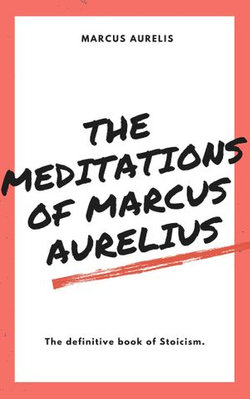Meditations is described by Wikipedia as "a series of personal writings by Marcus Aurelius, Roman Emperor from 161 to 180 AD, recording his private notes to himself and ideas on Stoic philosophy.
Marcus Aurelius wrote the 12 books of the Meditations in Koine Greek as a source for his own guidance and self-improvement. It is possible that large portions of the work were written at Sirmium, where he spent much time planning military campaigns from 170 to 180. Some of it was written while he was positioned at Aquincum on campaign in Pannonia, because internal notes tell us that the first book was written when he was campaigning against the Quadi on the river Granova (modern-day Hron) and the second book was written at Carnuntum.
It is unlikely that Marcus Aurelius ever intended the writings to be published and the work has no official title, so "Meditations" is one of several titles commonly assigned to the collection. These writings take the form of quotations varying in length from one sentence to long paragraphs.”
Excerpt from book 1:
I. Of my grandfather Verus I have learned to be gentle and meek, and to
refrain from all anger and passion. From the fame and memory of him that
begot me I have learned both shamefastness and manlike behaviour. Of my
mother I have learned to be religious, and bountiful; and to forbear,
not only to do, but to intend any evil; to content myself with a spare
diet, and to fly all such excess as is incidental to great wealth. Of my
great-grandfather, both to frequent public schools and auditories, and
to get me good and able teachers at home; and that I ought not to think
much, if upon such occasions, I were at excessive charges.
II. Of him that brought me up, not to be fondly addicted to either of
the two great factions of the coursers in the circus, called Prasini,
and Veneti: nor in the amphitheatre partially to favour any of the
gladiators, or fencers, as either the Parmularii, or the Secutores.
Moreover, to endure labour; nor to need many things; when I have
anything to do, to do it myself rather than by others; not to meddle
with many businesses; and not easily to admit of any slander.
III. Of Diognetus, not to busy myself about vain things, and not easily
to believe those things, which are commonly spoken, by such as take upon
them to work wonders, and by sorcerers, or prestidigitators, and
impostors; concerning the power of charms, and their driving out of
demons, or evil spirits; and the like. Not to keep quails for the game;
nor to be mad after such things. Not to be offended with other men's
liberty of speech, and to apply myself unto philosophy. Him also I must
thank, that ever I heard first Bacchius, then Tandasis and Marcianus,
and that I did write dialogues in my youth; and that I took liking to
the philosophers' little couch and skins, and such other things, which
by the Grecian discipline are proper to those who profess philosophy.



Share This eBook: